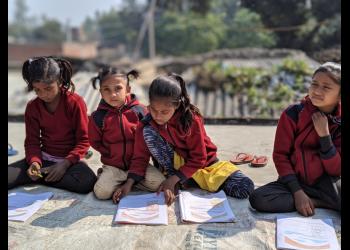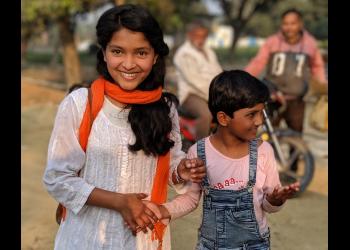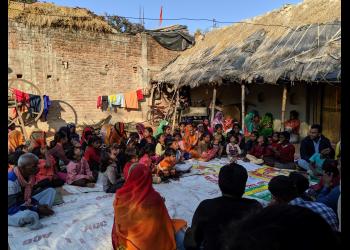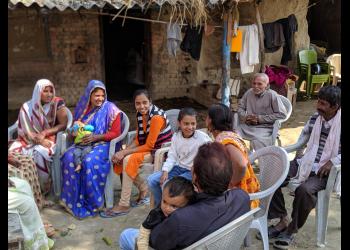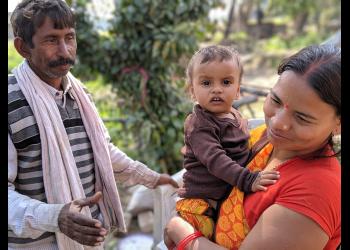Glimpses into the Spirit of Gender Equality: Hasankheda, India
The following is part of a series exploring how Baha’i communities have seen the principles of gender equality outlined in the Beijing Declaration and Platform for Action begin to take form in neighborhoods and villages around the world.
In rural areas of the Indian state of Uttar Pradesh, the day begins at first light or before. Work in the home and family fields unfolds according to rhythms sometimes hundreds of years in the making, and the influence of tradition is strong. But as they engage in a systematic exploration of the nobility of every human soul, residents in the village of Hasankheda are building new ways to relate to and interact with one another, women and men alike.
“Earlier there was a strong culture of Purdah here in the village,” says Reena, 32, referring to a custom whereby women are required to cover their head and face in front of men. In many cases the system extends to women being forced to stay inside their homes for years and sometimes even decades on end.
“Visiting neighbors or friends was very rare. Women never stepped out of their houses.”
Recently though, a fuller array of aspirations have begun impressing themselves on the consciousness of the community. Reena says that growing numbers are realizing that “this Purdah system is not more important than the education of children. Or letting women step out of the house. Or having consultations with each other. How we are able to consult with each other, reach out to other people, and solve our problems together has now become an important aspect of their lives.”
A process of education that hones both intellectual and spiritual capacities has been central to this transformation, says Reena.
She operates a primary school inspired by the teachings of the Baha’i Faith, serving some 80 children in the village. But she says that less formal neighborhood-based classes for the spiritual and moral education of young people, several of which she teaches herself, have been central to the process.
“We explained to parents that this is a program for children where they will imbibe spiritual education,” she relates. Parents came to realize that their children were striving to contribute to the common good, and that “they are able to apply these spiritual qualities not only in their own lives but also very effectively in the society.”
“They realized that their children derive immense joy in helping others.”
Change has come not only from children participating in classes, but by older youth and adults undergoing training to offer the classes to their neighbors and acquaintances. As participants progress through the training’s sequence of courses, they are assisted to undertake increasingly complex acts of service, such as visiting someone in her or his home to explore a theme of social or spiritual importance, or assisting a group of young adolescents to explore the positive and negative forces impacting their community.
One form of service that has had particular influence on norms in Hasankheda has been gatherings for neighbors to pray and discuss the implications of spiritual principles. Though simple and informal—often held in participants’ homes—such spaces have become a locus for the loosening of age-old gender restrictions.
These devotional gatherings, as they are called, are one of the few activities in which the possibility of women leaving their houses has found acceptance in the community. During the gatherings, women are starting to remove the scarves that cover their faces. They are also increasingly visiting one another's homes to extend invitations to those not yet attending a gathering.
As spaces that welcome participants of all backgrounds to discuss, worship, and eat together, devotional gatherings are also proving instrumental in breaking down caste prejudices. Reena’s own life testifies to the possibilities that can open up with movement in this direction. A member of the merchant class from a larger urban area, Reena met her future husband, who came from a lower caste family in the countryside, at a training in this educational process.
The couple had to wait three years to receive blessings from both sets of parents for the union. Today, however, their partnership speaks to the transformation that communities of any kind can advance. And the steadfast support of her husband and others like him, both moral and practical, demonstrates the role that men are increasingly ready to play.
The process under way, Reena says, is not so much about rejecting what has come before. Rather, it is about creating new options for women and girls—options to be internalized by women and men, young and old alike.
“The most outstanding feature you see nowadays is that women are more conscious about the education of their children, especially girls,” she says.
“They say that they were not able to get a proper education, which they regret. But they want to make sure that their children are not deprived of education. For this, they are ready to move out of the confines of their houses to speak with the teachers, and send their children to school.”
